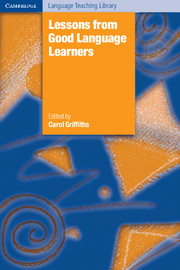Prologue
Published online by Cambridge University Press: 11 August 2009
Summary
Since this volume is commemorating Joan Rubin's seminal work on the good language learner and acknowledging the initiatives that it inspired, I thought it fitting to offer a brief prologue that will serve as an historical note regarding Joan's initial contribution to the topic of the good language learner. It is written more as a narrative since it is now in vogue to tell our stories as a means of enriching our academic experiences.
I was three years into my doctoral studies in international development education at Stanford University when I first met Joan in the fall of 1970. I had already had the pleasure of reading her study of Spanish–Guaraní bilingualism in Paraguay (Rubin, 1968) so I knew of her as a trained anthropologist and as an experienced sociolinguist. My advisor at the Committee on Linguistics at Stanford, Charles Ferguson, had told me many fine things about her.
Joan arrived at Stanford with questionnaire data she had collected in Indonesia as part of a sociolinguistic survey being conducted in various parts of the world, and her main mission was to analyze and report on the findings. I expected her to pursue her interests drawing on her survey work to make statements about language planning. What was a surprise for me at the time was to experience first hand Joan's keen fascination with the language learner and with studying the language learning act up close and personal.
- Type
- Chapter
- Information
- Lessons from Good Language Learners , pp. 7 - 9Publisher: Cambridge University PressPrint publication year: 2008
- 3
- Cited by



